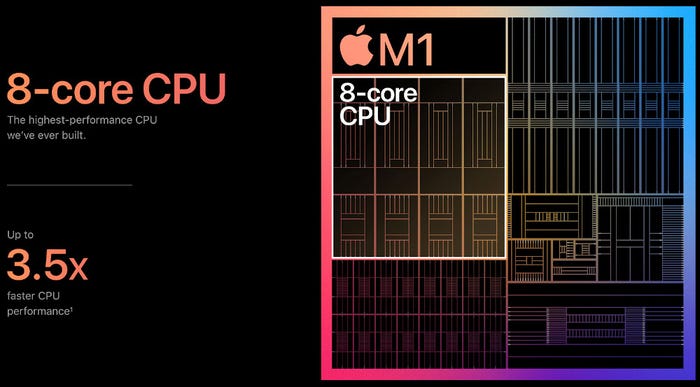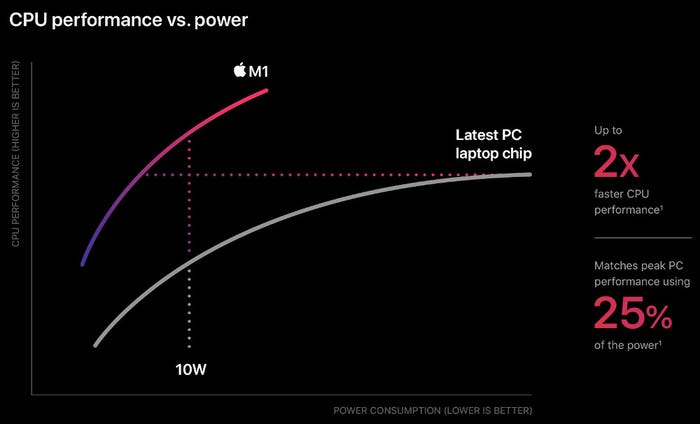Apple M1 chip represents another big win for mobile over the PC world
Gadget giant Apple has launched its first Macs using a souped-up version of its mobile chip instead of Intel ones.
November 11, 2020

Gadget giant Apple has launched its first Macs using a souped-up version of its mobile chip instead of Intel ones.
The M1 chip seems to be the A14 (which powers the latest iPhones) on steroids. It uses the latest 5nm manufacturing process, meaning it can cram even more transistors onto the same sized chip. The M1 has 16 billion of them. It’s an SoC (system on chip) so a lot of the processing inefficiencies that take place in traditional PCs by having to ferry date between components over the motherboard are removed, because all those components reside on the same chip.
This enables Apple to make the following claims: ‘It features the world’s fastest CPU core in low-power silicon, the world’s best CPU performance per watt, the world’s fastest integrated graphics in a personal computer.’ We have no reason to dispute those claims, but since power efficiency is not the priority in PCs that is it in smartphones, outright performance remains a key metric.
“There has never been a chip like M1, our breakthrough SoC for the Mac,” said Johny Srouji, Apple’s SVP of Hardware Technologies. “It builds on more than a decade of designing industry-leading chips for iPhone, iPad and Apple Watch, and ushers in a whole new era for the Mac.
“When it comes to low-power silicon, M1 has the world’s fastest CPU core, the world’s fastest integrated graphics in a personal computer, and the amazing machine learning performance of the Apple Neural Engine. With its unique combination of remarkable performance, powerful features and incredible efficiency, M1 is by far the best chip we’ve ever created.”

Of course Apple is going to be hyperbolic, but what do the third parties have to say? Veteran tech commentator Om Malik was impressed but noted the absence of metrics traditionally used to define chips, such as clock speed. Anandtech notes that even the A14 out-performed nearly all x86 (Intel and AMD) PC chips, so the M1 should be well ahead of them.
So at first glance the M1 Macs are going to have much better performance than Intel-based ones, which is bad news for the whole x86 world. While x86 never stood a chance against Arm microarchitecture in the mobile world, thanks to the latter’s much better power efficiency, it was generally assumed that it would always lead in situations where pure grunt was the priority.
The launch of the Apple M1 would appear to contradict that assumption, calling into question the long-term future of x86 chips in personal computing. If Apple can do this there’s not reason why Qualcomm can’t. PCs that require the highest performance may still be better off with discrete components such as graphics cards, but this could mark the moment the Arm ecosystem completes its conquest of the mainstream personal computing world.

About the Author
You May Also Like












_1.jpg?width=300&auto=webp&quality=80&disable=upscale)
